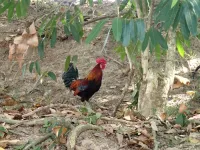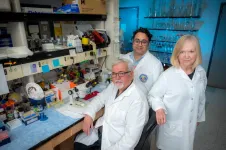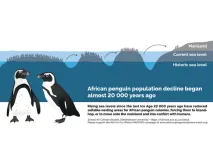(Press-News.org) Researchers at UNSW Sydney and Neuroscience Research Australia (NeuRA) have developed and evaluated a tool for assessing dementia risk, with promising initial results.
Currently, over 55 million people are living with dementia around the world, with that number set to increase to 78 million by 2030, and the focus on dementia research increasingly shifting towards prevention.
The online tool takes approximately 20 minutes to complete and provides a personalised dementia risk report that patients can discuss with their doctor.
Since developing the risk tool – known as CogDRisk – in 2022, the team has been evaluating the success of the tool, by trialling it on four existing datasets, with the results published recently in The Journal of Prevention of Alzheimer’s Disease.
On their analysis, they found that CogDrisk is effective at predicting dementia.
“There's lots of information about the risk factors for dementia in the academic literature,” says Professor Kaarin Anstey from UNSW’s School of Psychology and NeuRA.
“But there's a gap between just knowing the risks and actually being able to assess whether or not you have the risk, and then knowing what to do about it. CogDrisk was developed to address this.”
Collating the risk factors for dementia
Unsuccessful clinical trials for dementia treatment have led to urgent calls for dementia prevention.
“Prevention is now recognized by the World Health Organization as one of the key areas of research. Alzheimer's Disease International and most of the National Dementia action plans include dementia risk reduction,” says Prof. Anstey.
But while there are a lot of different studies on risk factors for dementia across the world, there's not necessarily always agreement on what the risk factors are. To address this problem, the team used statistical methods to combine all the risk factors cited in the existing literature.
“So we did a systematic review, to get all the different risk factors for dementia – those which were robust, and those which were modifiable and could be assessed through a self-report instrument,” says Prof. Anstey.
Some of the key modifiable risk factors that increase someone’s risk of dementia include insufficient physical activity, obesity in middle age, high blood pressure in middle age, smoking, and poor diet. “That whole process took several years, we published the review, and then we had to develop the risk assessment tool itself.”
Assessing the tool on different cohorts
Often risk assessment tools are developed on a single cohort and therefore fit a particular dataset and population, which doesn’t work well when applied to other populations.
This study analysed four different cohorts from existing medical studies, with varying demographics and a total of over 9500 participants.
The cohort data was matched against the key risk and protective factors assessed in the CogDrisk tool, including whether individuals have diabetes, depression and insomnia, information on their diet and eating habits and how much they engaged in physical activity.
The team were then able to match these to a record of dementia cases that developed within the same cohort.
“Our statistical analysis shows it's a very robust and generalisable tool,” says Prof. Anstey. “It works across different countries and different data sets. And it's also quite comprehensive, it includes a lot of the newer risk factors that weren't previously included.”
Challenge with predicting dementia and future uses of CogDrisk
Predicting dementia is more difficult than predicting some other diseases, partly because it progresses over two or three decades and there can be a strong genetic component.
“It's a multi-causal disease. But there are some modifiable risk factors. Most people want to know what their risk factors are and want to do something about them once they know,” says Prof Anstey. The team who developed the tool are hoping that in can be used in healthcare settings to make it easier for GPs and patients to get information on risk reduction.
“Not only are there lots of risk factors, but dementia itself is very complex, and GPs are very busy. So we're trying to develop ways of making it easier for the public and GPs to get the right information.”
Next, Prof. Anstey is looking to translate the online tool into different languages, so it’s accessible to more people. “And we're also looking at developing a short form of the tool. So there's a lot of happening in the research translation, as well as language translation space that we're working on.”
END
Online tool found to be effective at assessing dementia risk
Scientists hope the new tool could be used to make it easier for GPs and patients to get information on dementia risk factors.
2023-04-20
ELSE PRESS RELEASES FROM THIS DATE:
A myth no more: Cranberry products can prevent urinary tract infections for women
2023-04-20
Drinking cranberry juice has long been a mythical prevention strategy for women who develop a urinary tract infection – and new medical evidence shows consuming cranberry products is an effective way to prevent a UTI before it gets started.
A global study looking at the benefits of cranberry products published in Cochrane Reviews has determined cranberry juice, and its supplements, reduce the risk of repeat symptomatic UTIs in women by more than a quarter, in children by more than half, and in people susceptible to UTI following medical interventions by about ...
Recycling lake sediments for crop production: A sustainable solution for closing the phosphorus cycle
2023-04-20
A four-year field experiment conducted on the shores of restored Lake Mustijärv in Viljandi, Estonia, has revealed that recycling phosphorus-rich lake sediments back to agriculture could have positive impacts on crop production.
The study was conducted by doctoral researcher Mina Kiani and the AgriChar research group, and it is globally the first of its kind to cover the environmental aspects of recycling lake sediments to agriculture over several years. Kiani defends her thesis on 21 April at the University of Helsinki Faculty of Agriculture and Forestry.
The study aimed to find a sustainable solution for closing the leaking agricultural phosphorus (P) cycle by recycling P-rich ...
Chicken breeding in Japan dates back to fourth century BCE
2023-04-20
Conclusive evidence of chicken breeding in the Yayoi period of Japan has been discovered from the Karako-Kagi site.
The chicken is one of the most common domesticated animals, with a current estimated population of over 33 billion individuals. They are reared for their meat and eggs, and may be kept as pets.
The chicken is believed to have been domesticated in Southeast Asia about 3500 years ago, following which they were carried to all corners of the world. The exact date of introduction of chicken breeding to Japan is under debate, as there are no historical records and archeological evidence ...
Protecting the vision of premature babies
2023-04-20
AUGUSTA, Ga. (April 20, 2023) – In the spiraling cycle that can lead to vision loss in premature newborns, Medical College of Georgia scientists have found a new target and drug that together appear to stop the destruction in its tracks.
In babies, the development of the blood vessels of the retina should be complete by birth. But with preterm birth, the still-immature retina can develop a potentially blinding eye disorder known as retinopathy of prematurity.
When premature babies transition from inside the womb, where ...
African penguins: climate refugees from a distant past?
2023-04-20
Imagine the view from the western coastline of southern Africa during the Last Glacial Maximum (LGM) over twenty thousand years ago: in the distance you would see at least fifteen large islands – the largest 300 square kilometres in area – swarming with hundreds of millions of marine birds and penguin colonies.
Now imagine sea levels rising up to a hundred metres between fifteen to seven thousand years ago, gradually covering these large islands until only small hill tops and outcrops remained above water. Over the past 22 000 years this resulted in a tenfold ...
New study challenges the idea that early Parkinson’s Disease causes cognitive dysfunction
2023-04-19
Like many neurodegenerative diseases, Parkinson’s disease (PD) is a thief that hacks into human operating systems and corrupts their cognitive hard drives until they can no longer control their movements or perform activities of daily living.
Often, in its later stages, Parkinson’s disease steals data too, leading to memory loss, confusion and dementia.
Both the cause and cure of Parkinson’s disease remain elusive, but research has helped afflicted individuals manage their symptoms and lead healthier post-diagnosis lives. Individuals diagnosed with Parkinson’s ...
Fighting a national nursing faculty shortage
2023-04-19
Last year, nursing schools across the country were forced to turn away more than 90,000 qualified applicants. The reason: a lack of faculty members to teach them and clinical sites to train them.
A team of University of Texas at Arlington faculty led by Ann Eckhardt, clinical associate professor and interim chair of graduate nursing programs in the College of Nursing and Health Innovation (CONHI), received a state grant to help reverse that trend and increase the pool of nursing faculty, preceptors and simulation coordinators.
“There ...
Clinical trial begins using CAR T cells to potentially cure HIV
2023-04-19
UC Davis Health researchers have dosed the second participant in their clinical trial looking to identify a potential cure for HIV utilizing CAR T-cell therapy. The novel study uses immunotherapy. It involves taking a patient's own white blood cells, called T-cells, and modifying them so they can identify and target HIV cells to control the virus without medication.
The first participant was dosed with anti-HIV duoCAR T cells at UC Davis Medical Center in mid-August. The trial is the first-in-human clinical study investigating the duoCAR T-cell therapy for the treatment of HIV.
“We have reached ...
Older adults may achieve same cognition as undergrads
2023-04-19
A set of recent studies demonstrates for the first time that learning multiple new tasks carries benefits for cognition long after the learning has been completed.
The finding affirms a long-held assertion of the lead researcher, Rachel Wu, who is an associate professor of psychology at UC Riverside. That is, older adults can learn new tasks and improve their cognition in the process, if they approach learning as a child does.
“Our findings provide evidence that simultaneously learning real-world skills can lead to long-term improvements in cognition during older adulthood,” ...
New USGS-FEMA report updates economic risk from earthquakes
2023-04-19
Earthquakes cost the nation an estimated $14.7 billion annually in building damage and associated losses according to a new report released jointly today by the U.S. Geological Survey and the Federal Emergency Management Agency at the annual Seismological Society of America meeting.
The new estimate is twice that of previous annual estimates due to increased building value and the fact that the report incorporates the latest hazards as well as improvements to building inventories.
Earthquake losses from the last few decades in the U.S. have ranged about $1.5-$3 billion per year depending upon the timeframe. While ...
LAST 30 PRESS RELEASES:
Medicare patients get different stroke care depending on plan, analysis reveals
Polyploidy-induced senescence may drive aging, tissue repair, and cancer risk
Study shows that treating patients with lifestyle medicine may help reduce clinician burnout
Experimental and numerical framework for acoustic streaming prediction in mid-air phased arrays
Ancestral motif enables broad DNA binding by NIN, a master regulator of rhizobial symbiosis
Macrophage immune cells need constant reminders to retain memories of prior infections
Ultra-endurance running may accelerate aging and breakdown of red blood cells
Ancient mind-body practice proven to lower blood pressure in clinical trial
SwRI to create advanced Product Lifecycle Management system for the Air Force
Natural selection operates on multiple levels, comprehensive review of scientific studies shows
Developing a national research program on liquid metals for fusion
AI-powered ECG could help guide lifelong heart monitoring for patients with repaired tetralogy of fallot
Global shark bites return to average in 2025, with a smaller proportion in the United States
Millions are unaware of heart risks that don’t start in the heart
What freezing plants in blocks of ice can tell us about the future of Svalbard’s plant communities
A new vascularized tissueoid-on-a-chip model for liver regeneration and transplant rejection
Augmented reality menus may help restaurants attract more customers, improve brand perceptions
Power grids to epidemics: study shows small patterns trigger systemic failures
Computational insights into the interactions of andrographolide derivative SRJ09 with histone deacetylase for the management of beta thalassemia
A genetic brake that forms our muscles
CHEST announces first class of certified critical care advanced practice providers awarded CCAPP Designation
Jeonbuk National University researchers develop an innovative prussian-blue based electrode for effective and efficient cesium removal
Self-organization of cell-sized chiral rotating actin rings driven by a chiral myosin
Report: US history polarizes generations, but has potential to unite
Tiny bubbles, big breakthrough: Cracking cancer’s “fortress”
A biological material that becomes stronger when wet could replace plastics
Glacial feast: Seals caught closer to glaciers had fuller stomachs
Get the picture? High-tech, low-cost lens focuses on global consumer markets
Antimicrobial resistance in foodborne bacteria remains a public health concern in Europe
Safer batteries for storing energy at massive scale
[Press-News.org] Online tool found to be effective at assessing dementia riskScientists hope the new tool could be used to make it easier for GPs and patients to get information on dementia risk factors.




